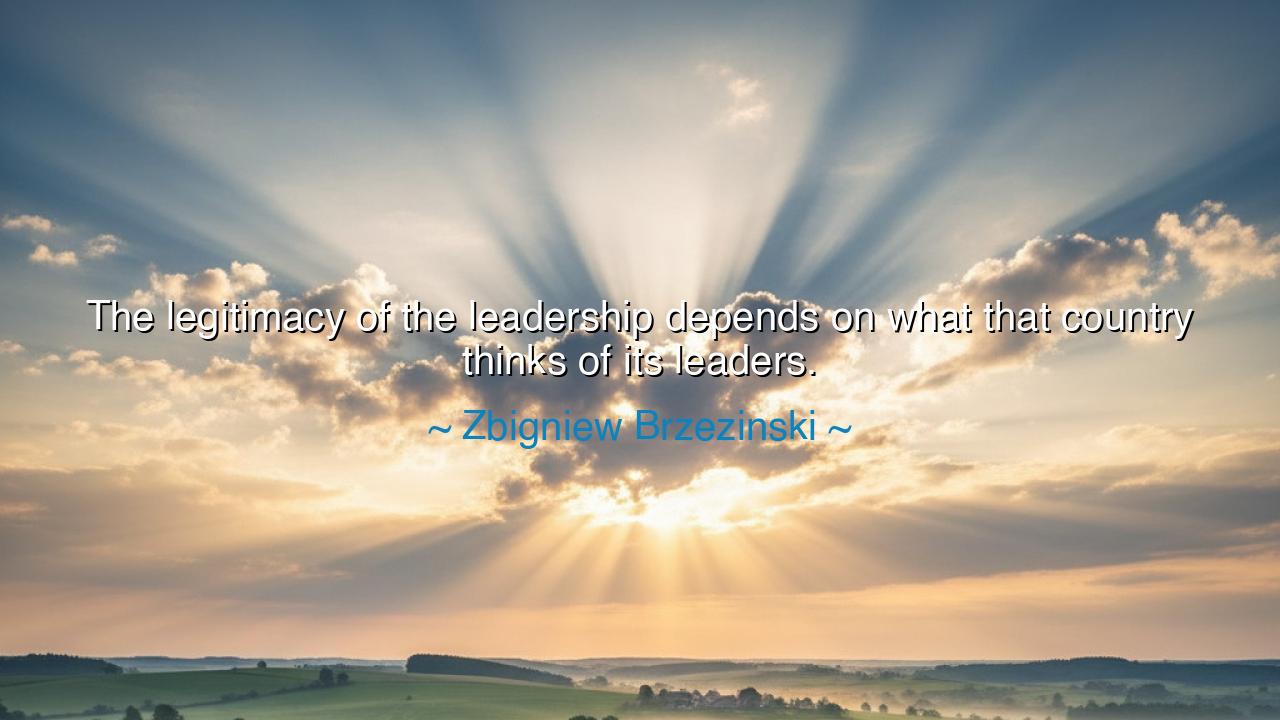
The legitimacy of the leadership depends on what that country






The words of Zbigniew Brzezinski, statesman and strategist of the modern age, resound with a truth as old as kingship itself: “The legitimacy of the leadership depends on what that country thinks of its leaders.” In this brief saying, he unmasks the essence of power. Authority is not secured merely by armies, nor by laws etched in stone, nor by wealth stored in coffers. True authority rests in the hearts of the people. When they believe in their leaders, the foundation of the state is firm; when they cease to believe, the throne, no matter how gilded, trembles and falls.
From the dawn of nations, rulers have sought legitimacy. The pharaohs of Egypt claimed divinity, believing that their people’s faith in their godhood would anchor their rule. The emperors of China spoke of the Mandate of Heaven, a sacred trust given only while the people saw them as just and worthy. When famine or corruption struck, the people declared the mandate lost, and dynasties crumbled. Brzezinski’s words are a modern echo of this ancient wisdom: the legitimacy of leadership is not self-proclaimed—it is granted, and it is fragile.
History gives us clear examples. Consider Louis XVI of France. Crowned king by tradition and law, he possessed the outward signs of power. Yet when the people no longer saw him as their protector, when hunger gnawed at their stomachs and his court danced in luxury, his leadership lost its legitimacy. The guillotine did what armies could not: it destroyed the illusion of unshakable kingship. Contrast this with George Washington, who could have seized a crown but instead bowed to the will of the people. His greatness was not in his command of troops but in the trust his nation placed in him, and in his decision to return that trust with humility.
The wisdom of Brzezinski teaches us that the thoughts of the people are more powerful than the decrees of rulers. A leader may command obedience through fear, but this is not legitimacy—it is tyranny, destined to decay. A leader may win office through cunning, but unless the people’s hearts align with their vision, their rule will be hollow. True legitimacy is born when the people see their leaders as reflections of their own hopes, as guardians of their common good.
O children of tomorrow, learn this well: leadership is a covenant, not a possession. It cannot be hoarded like gold, nor defended forever with steel. It must be renewed daily in the eyes of the governed. The people’s judgment, though silent, is the mightiest tribunal. When they approve, the leader’s voice is magnified; when they reject, no fortress is strong enough to protect him.
The lesson for us is clear. If you are ever called to lead, seek not legitimacy in titles, wealth, or force, but in service. Ask yourself daily: do those I lead believe I am worthy of the trust placed in me? And if you are among the governed, remember your power: your judgment is the measure by which legitimacy rises or falls. To withhold it from the corrupt is a duty; to give it to the worthy is a sacred act.
Practical action lies before us all. As citizens, we must weigh our leaders not by their words alone, but by their deeds. We must speak truth when they falter and lend support when they act with justice. As leaders, we must seek humility, listening as much as commanding, serving as much as guiding. For legitimacy is not claimed—it is given, and it can be taken away.
Thus remember Brzezinski’s wisdom: “The legitimacy of the leadership depends on what that country thinks of its leaders.” This is the eternal balance of ruler and ruled, of trust and responsibility. When upheld, nations flourish in harmony; when broken, nations collapse into chaos. Let us then guard this balance with vigilance, for upon it rests the fate of every people.






AAdministratorAdministrator
Welcome, honored guests. Please leave a comment, we will respond soon